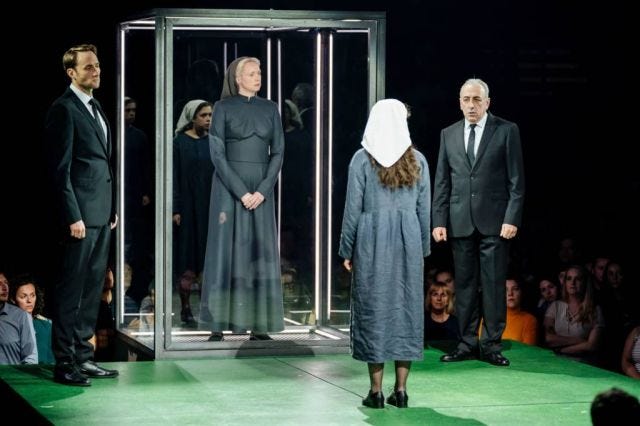Lady Business: Midsummer nights and Shakespearean power trips
Hello and welcome to Lady Business, a weekly newsletter about women, the business world, and all the ways they overlap. You can sign up for Lady Business and read previous issues here. This is the seventy-first issue, published June 13, 2019.
Much Ado About Midsummer

I spent last weekend in London, introducing my parents to all things Ottolenghi and stumbling across far too many pasty people riding bikes in the buff. (That link contains some NSFW, and also just plain unsanitary-seeming, photos of naked people being uncomfortable on bike seats.)
But the highlight was seeing some great, and very Lady Business-appropriate, theater. There was Top Girls, a revival of Caryl Churchill’s 1982 play about corporate feminism and great shoulder pads in the Thatcherite era; and, much more lighthearted, there was a fantastic new production of Midsummer Night’s Dream – which is not, usually, one of my favorite Shakespeare comedies. I nevertheless bought tickets on the promise of the immersive staging and the casting of Gwendoline Christie, my Game of Thrones fave Ser Brienne of Tarth.
Both were delightful! Yet I was about twenty minutes into the performance when I realized that this might be my favorite production ever of Midsummer for a much more fundamental reason: It swapped the lines, and thus the power dynamics, between the feuding King and Queen of the Fairies. In this production, Titania gets Puck, and control over the titular dream. She’s the one to play a mean prank on her estranged husband (and Christie’s line reading of “Wake when some vile thing is near” is deliciously loathing). While Titania usually spends Midsummer as a figure of ridicule, who has to be chastened into submitting to her husband, this time Oberon is the one to fall in enchanted love with an ass, and to make a public fool out of himself. This time, Titania wins the spousal showdown and maintains power over her kingdom, her marriage, and her story.
It’s such a smart reversal, especially given that Midsummer is framed by a much more grim relationship: Athenian Duke Theseus, having captured Amazonian Queen Hippolyta in battle, is forcing her into marriage. Theseus and Hippolyta are usually played by the same actors as Oberon and Titania; this production starts with Christie-as-Hippolyta in a glass cage, displayed to the audience as a silent prisoner of war, but soon frees her Titania to literally pull the strings from above the action:

So giving her this upper hand in the Titania-Oberon marriage -- and heavily implying that the fairy spouses are inhabiting their human counterparts -- might be the only way to make the Theseus-Hippolyta relationship seem, uh, not rape.
Which is a recurring problem with Shakespeare’s comedies: The romances so rarely hold up as happy for women. I’m not even talking about the obvious problem plays, like Taming of the Shrew; the gender power dynamics are quietly just as bad in what I’ve long considered one of my favorites, Much Ado About Nothing. As I wrote in 2014:
For me and, I suspect, for a lot of women and feminists and fans of the best aspects of romantic comedies, Much Ado’s appeal also comes from the fact that Beatrice takes very little shit from anyone, ever. She ends the play married, yes, but defining her own terms for that marriage. She gets to end the play as equal as any of Shakespeare’s women ever get to be to their romantic partners, and more equal than most women in literature written by men get to be. She gets to end the play speaking, and perhaps even more importantly, being heard.
… But that leaves us with Hero, the cautionary anti-Beatrice. Whose silence gets harder and harder to ignore every time I see the play.
Hero, the ironically-named plot device masquerading as a main character, barely gets to say anything for the first half of the play. She has one line in the first act, and six more in the second, according to Open Source Shakespeare.
That only gets slightly better as the play goes on and things really start happening to Hero. Beatrice gets to speak on 106 separate occasions in Much Ado. Benedick has 134 such opportunities to speak, and Claudio 125. Hero gets 44.
This even though Hero’s character -- or at least her virginity, and alleged lack thereof -- drives Much Ado's plot. It’s a very weird story for modern audiences, and an increasingly nonsensical one for productions that claim a modern setting. Like Joss Whedon’s frothy movie of a few years ago, or the new Public Theater/Shakespeare in the Park production starring Danielle Brooks and a Stacey Abrams 2020 banner:

This Much Ado is a great idea on paper: It’s set in modern Atlanta, with an entirely African-American cast, and a returning “army” of #resistance fighters. But the setting winds up feeling like so much window dressing, undermined by a plot that’s nonsensical for any woman living in Atlanta today. As the great Sara Holdren points out in her Vulture review, “It’s hard to get around the fact that the conflict turns on not simply whether the innocent ingénue cheated on her jealous fiancé but whether she is, as all unwed ladies should be, ‘as chaste as is the bud ere it be blown.’”
When I saw the play a few weeks ago, I left thinking that maybe Much Ado is unsalvageable. The purity plot is so central, Shakespeare’s gospel so well-established, that maybe there’s just no way to fix it. Maybe this fave is too irrevocably problematic.
Then, last week, I saw a Midsummer that thought about the story’s gender power dynamics, and what makes sense to modern audiences, and how it could marry the two. I saw a romantic comedy that wanted to get its story right, rather than stay doggedly faithful to a 400-year-old text -- and that was willing to put in the work to pull it off. Maybe someday, someone can figure out how to do that for Much Ado.
Lady Bits
--Speaking of modern feminist reinventions of very old stories, I’m feeling very vindicated by Hadestown’s eight Tony awards -- especially for songwriter Anais Mitchell and director Rachel Chavkin, whose acceptance speech rightly made headlines: “There are so many women who are ready to go. There are so many artists of color who are ready to go. … This is not a pipeline issue. It is a failure of imagination.”
--Everything about The Good Place is perfect, endings edition.
--“What is so important about Schreiber’s trajectory is its symbolism, not just for women, but also for what sports journalism should be: journalism. …Sports is a multi-billion dollar industrial complex. And it’s ground zero for civil rights battles in this country.” Some good obits of Le Anne Schreiber, the first -- and still only -- woman to run the New York Times’ sport section.
--Is AA’s actual success rate really only between 5 and 8 percent? An older but new-to-me Atlantic longread on the dominant treatment for alcoholism -- and the lesser-known, but more scientifically studied, alternatives available.
--Book stuff: I’ll be at Soho House this evening to talk about my book with Her Story of Success podcast host Leah Hayes; if you’re in the area and want to join me, let me know!
Thank you for reading, commenting, and subscribing to this newsletter! Please tell your friends to sign up here, let me know what you think about this week's issue, and what else you'd like to see me write about: maria.aspan@gmail.com


